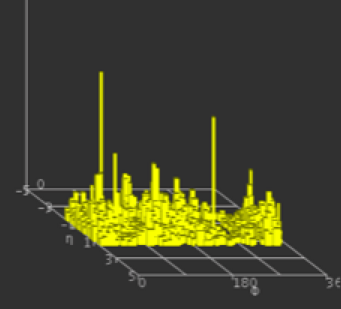Wiki Markup
At the LHC, large number of jets are expected from the increased initial state radiation, larger underlying event (UE), and by the presence many additional minimum bias (MB) collisions from other proton pairs in the same bunch crossing. This new jet environment at the LHC poses not only experimental challenges related to the reconstruction, calibration, and identification of hadronic jets, but it also demands a detailed understanding of multi-jet final signatures involving configurations of non-isolated jets across a very large transverse momentum and rapidity ranges.
Wiki Markup Wiki Markup
be applied to the input calorimeter signals in ATLAS, represented by energy depositions in a 2-dimensional (phi vs rapidity) spatial grid as shown in the next figure: !Picture 5.png|align=center! Alternative methods to interpret LHC data in busy hadronic final states may involve the use of image processing techniques (Fourier, Wavelets) to find energy patterns simultaneously at different spacial resolution scales [3]. Such techniques can be applied to the input calorimeter signals in ATLAS, represented by energy depositions in a 2-dimensional (phi vs rapidity) spatial grid as shown in the next figure:
This project consists of studying the performance of Fourier-based jet reconstruction algorithms in multi-jet events, and its application to the study of simulated Hidden Valley signals in the ATLAS detector.
References:
Wiki Markup
Wiki Markup
Wiki Markup
